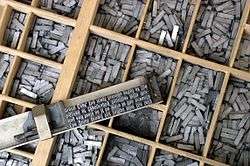type
English

Types (character used for printing).
Etymology
From Middle English type (“symbol, figure, emblem”), from Latin typus, from Ancient Greek τύπος (túpos, “mark, impression, type”), from τύπτω (túptō, “I strike, beat”).
Pronunciation
- IPA(key): /taɪp/
Audio (US) (file) Audio (file) - Rhymes: -aɪp
Noun
type (plural types)
- A grouping based on shared characteristics; a class.
- 2012 March 1, Lee A. Groat, “Gemstones”, in American Scientist, volume 100, number 2, page 128:
- Although there are dozens of different types of gems, among the best known and most important are diamond, ruby and sapphire, emerald and other gem forms of the mineral beryl, chrysoberyl, tanzanite, tsavorite, topaz and jade.
- This type of plane can handle rough weather more easily than that type of plane.
-
- An individual considered typical of its class, one regarded as typifying a certain profession, environment, etc.
- 2002, Pat Conroy, The Great Santini, page 4:
- "I just peeked out toward the restaurant and there are a lot of Navy types in there. I'd hate for you to get in trouble on your last night in Europe."
- 2002, Pat Conroy, The Great Santini, page 4:
- An individual that represents the ideal for its class; an embodiment.
- 1872, Mary Rose Godfrey, Loyal, volume 3, page 116:
- Altogether he was the type of low ruffianism — as ill-conditioned a looking brute as ever ginned a hare.
- 1872, Mary Rose Godfrey, Loyal, volume 3, page 116:
- (printing, countable) A letter or character used for printing, historically a cast or engraved block.
- (taxonomy) Something, often a specimen, selected as an objective anchor to connect a scientific name to a taxon; this need not be representative or typical.
- the type of a genus, family, etc.
- Preferred sort of person; sort of person that one is attracted to.
- We can't get along: he's just not my type.
- He was exactly her type.
- (medicine) A blood group.
- (corpus linguistics) A word that occurs in a text or corpus irrespective of how many times it occurs, as opposed to a token.
- (theology) An event or person that prefigures or foreshadows a later event - commonly an Old Testament event linked to Christian times.
- (computing theory) A tag attached to variables and values used in determining which kinds of value can be used in which situations; a data type.
- (fine arts) The original object, or class of objects, scene, face, or conception, which becomes the subject of a copy; especially, the design on the face of a medal or a coin.
- (chemistry) A simple compound, used as a mode or pattern to which other compounds are conveniently regarded as being related, and from which they may be actually or theoretically derived.
- The fundamental types used to express the simplest and most essential chemical relations are hydrochloric acid, water, ammonia, and methane.
- (mathematics) A part of the partition of the object domain of a logical theory (which due to the existence of such partition, would be called a typed theory). (Note: this corresponds to the notion of "data type" in computing theory.)
- Types, theory of. V.N. Grishin (originator), Encyclopedia of Mathematics. URL: http://www.encyclopediaofmath.org/index.php?title=Types,_theory_of&oldid=14150
- Logics of the second and higher orders may be regarded as type-theoretic systems.
- Categorial grammar is like a combination of context-free grammar and types.
- Types, theory of. V.N. Grishin (originator), Encyclopedia of Mathematics. URL: http://www.encyclopediaofmath.org/index.php?title=Types,_theory_of&oldid=14150
Synonyms
Hyponyms
Hyponyms
- ideal type
- movable type
- normal type
- primitive type
- structured type
- user-defined type
Derived terms
- aftertype
- antitype
- archetype
- cotype
- delegate-type
- foretype
- paratype
- stereotype
- syntype
- typeface
- typeless
- typesafe
- type-safe
- typesetter
- type specimen
- typewriter
- typography
- typology
Related terms
- type checking
- type coercion
- type conversion
Translations
individual considered typical of its class
individual that represents the ideal for its class
block with a raised letter or character on its surface
|
biology: individual representative of its taxonomic group
preferred sort of person
blood group — see blood type
theology: event or person that prefigures or foreshadows
computing theory: tag indicating data type
|
fine arts: original object, which becomes the subject of a copy
chemistry: simple compound, used as a mode or pattern
mathematics: part of the partition of the object domain
Verb

Hands of a person typing.
type (third-person singular simple present types, present participle typing, simple past and past participle typed)
- To put text on paper using a typewriter.
- To enter text or commands into a computer using a keyboard.
- To determine the blood type of.
- The doctor ordered the lab to type the patient for a blood transfusion.
- To represent by a type, model, or symbol beforehand; to prefigure.
- (Can we find and add a quotation of White (Johnson) to this entry?)
- To furnish an expression or copy of; to represent; to typify.
- Tennyson
- Let us type them now in our own lives.
- Tennyson
- To categorize into types.
- 1998, Dana Stabenow, Fire and Ice, page 1:
- It was a full load, a disparate group that he had already typed and cross-matched with their potential for future crime.
-
Descendants
- Esperanto: tajpi
Translations
to use a typewriter
|
|
to enter characters into a computer using keyboard
|
|
to determine blood group
- The translations below need to be checked and inserted above into the appropriate translation tables, removing any numbers. Numbers do not necessarily match those in definitions. See instructions at Wiktionary:Entry layout#Translations.
References
- type at OneLook Dictionary Search
Dutch
Etymology
From Latin typus, from Ancient Greek τύπος (túpos, “mark, impression, type”), from τύπτω (túptō, “I strike, beat”).
Pronunciation
Audio (file) - Hyphenation: ty‧pe
Noun
type n (plural types or typen, diminutive typetje n)
- type: a class, someone or something from a class. The diminutive is used when made into a caricature.
Derived terms
French
Etymology
Borrowed from Ecclesiastical Latin typus, from Ancient Greek τύπος (túpos).
Pronunciation
- IPA(key): /tip/
audio (file)
Further reading
- “type” in le Trésor de la langue française informatisé (The Digitized Treasury of the French Language).
Latin
Norwegian Bokmål
Etymology
From Ancient Greek τύπος (túpos).
Norwegian Nynorsk
Etymology
From Ancient Greek τύπος (túpos).
Noun
type m (definite singular typen, indefinite plural typar, definite plural typane)
- a type (kind, sort)
References
- “type” in The Nynorsk Dictionary.
This article is issued from
Wiktionary.
The text is licensed under Creative
Commons - Attribution - Sharealike.
Additional terms may apply for the media files.